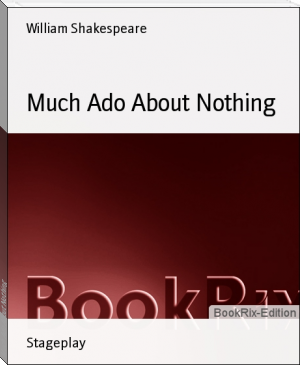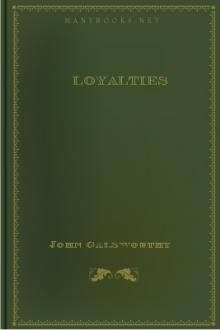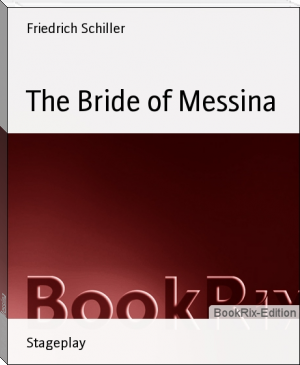Much Ado About Nothing, William Shakespeare [books to read for self improvement .TXT] 📗

- Author: William Shakespeare
Book online «Much Ado About Nothing, William Shakespeare [books to read for self improvement .TXT] 📗». Author William Shakespeare
is here, a man may live as quiet in hell as in a sanctuary; and people sin upon purpose because they would go thither; so indeed, all disquiet, horror and perturbation follow her.
[Re-enter CLAUDIO, BEATRICE, HERO, and LEONATO.]
DON PEDRO. Look! here she comes.
BENEDICK. Will your Grace command me any service to the world's end? I will go on the slightest errand now to the Antipodes that you can devise to send me on; I will fetch you a toothpicker now from the furthest inch of Asia; bring you the length of Prester John's foot; fetch you a hair off the Great Cham's beard; do you any embassage to the Pygmies, rather than hold three words' conference with this harpy. You have no employment for me?
DON PEDRO. None, but to desire your good company.
BENEDICK. O God, sir, here's a dish I love not: I cannot endure my Lady Tongue.
[Exit.]
DON PEDRO. Come, lady, come; you have lost the heart of Signior Benedick.
BEATRICE. Indeed, my lord, he lent it me awhile; and I gave him use for it, a double heart for a single one: marry, once before he won it of me with false dice, therefore your Grace may well say I have lost it.
DON PEDRO. You have put him down, lady, you have put him down.
BEATRICE. So I would not he should do me, my lord, lest I should prove the mother of fools. I have brought Count Claudio, whom you sent me to seek.
DON PEDRO. Why, how now, count! wherefore are you sad?
CLAUDIO. Not sad, my lord.
DON PEDRO. How then? Sick?
CLAUDIO. Neither, my lord.
BEATRICE. The count is neither sad, nor sick, nor merry, nor well; but civil count, civil as an orange, and something of that jealous complexion.
DON PEDRO. I' faith, lady, I think your blazon to be true; though, I'll be sworn, if he be so, his conceit is false. Here, Claudio, I have wooed in thy name, and fair Hero is won; I have broke with her father, and, his good will obtained; name the day of marriage, and God give thee joy!
LEONATO. Count, take of me my daughter, and with her my fortunes: his Grace hath made the match, and all grace say Amen to it!
BEATRICE. Speak, Count, 'tis your cue.
CLAUDIO. Silence is the perfectest herald of joy: I were but little happy, if I could say how much. Lady, as you are mine, I am yours: I give away myself for you and dote upon the exchange.
BEATRICE. Speak, cousin; or, if you cannot, stop his mouth with a kiss, and let not him speak neither.
DON PEDRO. In faith, lady, you have a merry heart.
BEATRICE. Yea, my lord; I thank it, poor fool, it keeps on the windy side of care. My cousin tells him in his ear that he is in her heart.
CLAUDIO. And so she doth, cousin.
BEATRICE. Good Lord, for alliance! Thus goes every one to the world but I, and I am sunburnt. I may sit in a corner and cry heigh-ho for a husband!
DON PEDRO. Lady Beatrice, I will get you one.
BEATRICE. I would rather have one of your father's getting. Hath your Grace ne'er a brother like you? Your father got excellent husbands, if a maid could come by them.
DON PEDRO. Will you have me, lady?
BEATRICE. No, my lord, unless I might have another for working days: your Grace is too costly to wear every day. But, I beseech your Grace, pardon me; I was born to speak all mirth and no matter.
DON PEDRO. Your silence most offends me, and to be merry best becomes you; for out of question, you were born in a merry hour.
BEATRICE. No, sure, my lord, my mother cried; but then there was a star danced, and under that was I born. Cousins, God give you joy!
LEONATO. Niece, will you look to those things I told you of?
BEATRICE. I cry you mercy, uncle. By your Grace's pardon.
[Exit.]
DON PEDRO. By my troth, a pleasant spirited lady.
LEONATO. There's little of the melancholy element in her, my lord: she is never sad but when she sleeps; and not ever sad then, for I have heard my daughter say, she hath often dreamed of unhappiness and waked herself with laughing.
DON PEDRO. She cannot endure to hear tell of a husband.
LEONATO. O! by no means: she mocks all her wooers out of suit.
DON PEDRO. She were an excellent wife for Benedick.
LEONATO. O Lord! my lord, if they were but a week married, they would talk themselves mad.
DON PEDRO. Count Claudio, when mean you to go to church?
CLAUDIO. To-morrow, my lord. Time goes on crutches till love have all his rites.
LEONATO. Not till Monday, my dear son, which is hence a just seven-night; and a time too brief too, to have all things answer my mind.
DON PEDRO. Come, you shake the head at so long a breathing; but, I warrant thee, Claudio, the time shall not go dully by us. I will in the interim undertake one of Hercules' labours, which is, to bring Signior Benedick and the Lady Beatrice into a mountain of affection the one with the other. I would fain have it a match; and I doubt not but to fashion it, if you three will but minister such assistance as I shall give you direction.
LEONATO. My lord, I am for you, though it cost me ten nights' watchings.
CLAUDIO. And I, my lord.
DON PEDRO. And you too, gentle Hero?
HERO. I will do any modest office, my lord, to help my cousin to a good husband.
DON PEDRO. And Benedick is not the unhopefullest husband that I know. Thus far can I praise him; he is of a noble strain, of approved valour, and confirmed honesty. I will teach you how to humour your cousin, that she shall fall in love with Benedick; and I, with your two helps, will so practise on Benedick that, in despite of his quick wit and his queasy stomach, he shall fall in love with Beatrice. If we can do this, Cupid is no longer an archer: his glory shall be ours, for we are the only love-gods. Go in with me, and I will tell you my drift.
[Exeunt.]
Scene 2. Another room in LEONATO'S house.
[Enter DON JOHN and BORACHIO.]
DON JOHN. It is so; the Count Claudio shall marry the daughter of Leonato.
BORACHIO. Yea, my lord; but I can cross it.
DON JOHN. Any bar, any cross, any impediment will be medicinable to me: I am sick in displeasure to him, and whatsoever comes athwart his affection ranges evenly with mine. How canst thou cross this marriage?
BORACHIO. Not honestly, my lord; but so covertly that no dishonesty shall appear in me.
DON JOHN. Show me briefly how.
BORACHIO. I think I told your lordship, a year since, how much I am in the favour of Margaret, the waiting-gentlewoman to Hero.
DON JOHN. I remember.
BORACHIO. I can, at any unseasonable instant of the night, appoint her to look out at her lady's chamber window.
DON JOHN. What life is in that, to be the death of this marriage?
BORACHIO. The poison of that lies in you to temper. Go you to the prince your brother; spare not to tell him, that he hath wronged his honour in marrying the renowned Claudio, - whose estimation do you mightily hold up, - to a contaminated stale, such a one as Hero.
DON JOHN. What proof shall I make of that?
BORACHIO. Proof enough to misuse the prince, to vex Claudio, to undo Hero, and kill Leonato. Look you for any other issue?
DON JOHN. Only to despite them, I will endeavour anything.
BORACHIO. Go then; find me a meet hour to draw Don Pedro and the Count Claudio alone: tell them that you know that Hero loves me; intend a kind of zeal both to the prince and Claudio, as - in love of your brother's honour, who hath made this match, and his friend's reputation, who is thus like to be cozened with the semblance of a maid, - that you have discovered thus. They will scarcely believe this without trial: offer them instances, which shall bear no less likelihood than to see me at her chamber-window, hear me call Margaret Hero, hear Margaret term me Claudio; and bring them to see this the very night before the intended wedding: for in the meantime I will so fashion the matter that Hero shall be absent; and there shall appear such seeming truth of Hero's disloyalty, that jealousy shall be called assurance, and all the preparation overthrown.
DON JOHN. Grow this to what adverse issue it can, I will put it in practice. Be cunning in the working this, and thy fee is a thousand ducats.
BORACHIO. Be you constant in the accusation, and my cunning shall not shame me.
DON JOHN. I will presently go learn their day of marriage.
[Exeunt.]
Scene 3. - LEONATO'S Garden.
[Enter Benedick.]
BENEDICK. Boy!
[Enter a Boy.]
BOY. Signior?
BENEDICK. In my chamber-window lies a book; bring it hither to me in the orchard.
BOY. I am here already, sir.
BENEDICK. I know that; but I would have thee hence, and here again. [Exit Boy.] I do much wonder that one man, seeing how much another man is a fool when he dedicates his behaviours to love, will, after he hath laughed at such shallow follies in others, become the argument of his own scorn by falling in love: and such a man is Claudio. I have known, when there was no music with him but the drum and the fife; and now had he rather hear the tabor and the pipe: I have known when he would have walked ten mile afoot to see a good armour; and now will he lie ten nights awake, carving the fashion of a new doublet. He was wont to speak plain and to the purpose, like an honest man and a soldier; and now is he turned orthography; his words are a very fantastical banquet, just so many strange dishes. May I be so converted, and see with these eyes? I cannot tell; I think not: I will not be sworn but love may transform me to an oyster; but I'll take my oath on it, till he have made an oyster of me, he shall never make me such a fool. One woman is fair, yet I am well; another is wise, yet I am well; another virtuous, yet I am well; but till all graces be in one woman, one woman shall not come in my grace. Rich she shall be, that's certain; wise, or I'll none; virtuous, or I'll never cheapen her; fair, or I'll never look on her; mild, or come not near me; noble, or not I for an angel; of good discourse, an excellent musician, and her hair shall be of what colour it please God. Ha! the prince and Monsieur Love! I will hide me in the arbour. [Withdraws.]
[Enter DON PEDRO, LEONATO, and CLAUDIO, followed by BALTHAZAR and Musicians.]
DON PEDRO. Come, shall we hear this music?
CLAUDIO. Yea, my good lord. How still the evening is, As hush'd on purpose to grace harmony!
DON PEDRO. See
[Re-enter CLAUDIO, BEATRICE, HERO, and LEONATO.]
DON PEDRO. Look! here she comes.
BENEDICK. Will your Grace command me any service to the world's end? I will go on the slightest errand now to the Antipodes that you can devise to send me on; I will fetch you a toothpicker now from the furthest inch of Asia; bring you the length of Prester John's foot; fetch you a hair off the Great Cham's beard; do you any embassage to the Pygmies, rather than hold three words' conference with this harpy. You have no employment for me?
DON PEDRO. None, but to desire your good company.
BENEDICK. O God, sir, here's a dish I love not: I cannot endure my Lady Tongue.
[Exit.]
DON PEDRO. Come, lady, come; you have lost the heart of Signior Benedick.
BEATRICE. Indeed, my lord, he lent it me awhile; and I gave him use for it, a double heart for a single one: marry, once before he won it of me with false dice, therefore your Grace may well say I have lost it.
DON PEDRO. You have put him down, lady, you have put him down.
BEATRICE. So I would not he should do me, my lord, lest I should prove the mother of fools. I have brought Count Claudio, whom you sent me to seek.
DON PEDRO. Why, how now, count! wherefore are you sad?
CLAUDIO. Not sad, my lord.
DON PEDRO. How then? Sick?
CLAUDIO. Neither, my lord.
BEATRICE. The count is neither sad, nor sick, nor merry, nor well; but civil count, civil as an orange, and something of that jealous complexion.
DON PEDRO. I' faith, lady, I think your blazon to be true; though, I'll be sworn, if he be so, his conceit is false. Here, Claudio, I have wooed in thy name, and fair Hero is won; I have broke with her father, and, his good will obtained; name the day of marriage, and God give thee joy!
LEONATO. Count, take of me my daughter, and with her my fortunes: his Grace hath made the match, and all grace say Amen to it!
BEATRICE. Speak, Count, 'tis your cue.
CLAUDIO. Silence is the perfectest herald of joy: I were but little happy, if I could say how much. Lady, as you are mine, I am yours: I give away myself for you and dote upon the exchange.
BEATRICE. Speak, cousin; or, if you cannot, stop his mouth with a kiss, and let not him speak neither.
DON PEDRO. In faith, lady, you have a merry heart.
BEATRICE. Yea, my lord; I thank it, poor fool, it keeps on the windy side of care. My cousin tells him in his ear that he is in her heart.
CLAUDIO. And so she doth, cousin.
BEATRICE. Good Lord, for alliance! Thus goes every one to the world but I, and I am sunburnt. I may sit in a corner and cry heigh-ho for a husband!
DON PEDRO. Lady Beatrice, I will get you one.
BEATRICE. I would rather have one of your father's getting. Hath your Grace ne'er a brother like you? Your father got excellent husbands, if a maid could come by them.
DON PEDRO. Will you have me, lady?
BEATRICE. No, my lord, unless I might have another for working days: your Grace is too costly to wear every day. But, I beseech your Grace, pardon me; I was born to speak all mirth and no matter.
DON PEDRO. Your silence most offends me, and to be merry best becomes you; for out of question, you were born in a merry hour.
BEATRICE. No, sure, my lord, my mother cried; but then there was a star danced, and under that was I born. Cousins, God give you joy!
LEONATO. Niece, will you look to those things I told you of?
BEATRICE. I cry you mercy, uncle. By your Grace's pardon.
[Exit.]
DON PEDRO. By my troth, a pleasant spirited lady.
LEONATO. There's little of the melancholy element in her, my lord: she is never sad but when she sleeps; and not ever sad then, for I have heard my daughter say, she hath often dreamed of unhappiness and waked herself with laughing.
DON PEDRO. She cannot endure to hear tell of a husband.
LEONATO. O! by no means: she mocks all her wooers out of suit.
DON PEDRO. She were an excellent wife for Benedick.
LEONATO. O Lord! my lord, if they were but a week married, they would talk themselves mad.
DON PEDRO. Count Claudio, when mean you to go to church?
CLAUDIO. To-morrow, my lord. Time goes on crutches till love have all his rites.
LEONATO. Not till Monday, my dear son, which is hence a just seven-night; and a time too brief too, to have all things answer my mind.
DON PEDRO. Come, you shake the head at so long a breathing; but, I warrant thee, Claudio, the time shall not go dully by us. I will in the interim undertake one of Hercules' labours, which is, to bring Signior Benedick and the Lady Beatrice into a mountain of affection the one with the other. I would fain have it a match; and I doubt not but to fashion it, if you three will but minister such assistance as I shall give you direction.
LEONATO. My lord, I am for you, though it cost me ten nights' watchings.
CLAUDIO. And I, my lord.
DON PEDRO. And you too, gentle Hero?
HERO. I will do any modest office, my lord, to help my cousin to a good husband.
DON PEDRO. And Benedick is not the unhopefullest husband that I know. Thus far can I praise him; he is of a noble strain, of approved valour, and confirmed honesty. I will teach you how to humour your cousin, that she shall fall in love with Benedick; and I, with your two helps, will so practise on Benedick that, in despite of his quick wit and his queasy stomach, he shall fall in love with Beatrice. If we can do this, Cupid is no longer an archer: his glory shall be ours, for we are the only love-gods. Go in with me, and I will tell you my drift.
[Exeunt.]
Scene 2. Another room in LEONATO'S house.
[Enter DON JOHN and BORACHIO.]
DON JOHN. It is so; the Count Claudio shall marry the daughter of Leonato.
BORACHIO. Yea, my lord; but I can cross it.
DON JOHN. Any bar, any cross, any impediment will be medicinable to me: I am sick in displeasure to him, and whatsoever comes athwart his affection ranges evenly with mine. How canst thou cross this marriage?
BORACHIO. Not honestly, my lord; but so covertly that no dishonesty shall appear in me.
DON JOHN. Show me briefly how.
BORACHIO. I think I told your lordship, a year since, how much I am in the favour of Margaret, the waiting-gentlewoman to Hero.
DON JOHN. I remember.
BORACHIO. I can, at any unseasonable instant of the night, appoint her to look out at her lady's chamber window.
DON JOHN. What life is in that, to be the death of this marriage?
BORACHIO. The poison of that lies in you to temper. Go you to the prince your brother; spare not to tell him, that he hath wronged his honour in marrying the renowned Claudio, - whose estimation do you mightily hold up, - to a contaminated stale, such a one as Hero.
DON JOHN. What proof shall I make of that?
BORACHIO. Proof enough to misuse the prince, to vex Claudio, to undo Hero, and kill Leonato. Look you for any other issue?
DON JOHN. Only to despite them, I will endeavour anything.
BORACHIO. Go then; find me a meet hour to draw Don Pedro and the Count Claudio alone: tell them that you know that Hero loves me; intend a kind of zeal both to the prince and Claudio, as - in love of your brother's honour, who hath made this match, and his friend's reputation, who is thus like to be cozened with the semblance of a maid, - that you have discovered thus. They will scarcely believe this without trial: offer them instances, which shall bear no less likelihood than to see me at her chamber-window, hear me call Margaret Hero, hear Margaret term me Claudio; and bring them to see this the very night before the intended wedding: for in the meantime I will so fashion the matter that Hero shall be absent; and there shall appear such seeming truth of Hero's disloyalty, that jealousy shall be called assurance, and all the preparation overthrown.
DON JOHN. Grow this to what adverse issue it can, I will put it in practice. Be cunning in the working this, and thy fee is a thousand ducats.
BORACHIO. Be you constant in the accusation, and my cunning shall not shame me.
DON JOHN. I will presently go learn their day of marriage.
[Exeunt.]
Scene 3. - LEONATO'S Garden.
[Enter Benedick.]
BENEDICK. Boy!
[Enter a Boy.]
BOY. Signior?
BENEDICK. In my chamber-window lies a book; bring it hither to me in the orchard.
BOY. I am here already, sir.
BENEDICK. I know that; but I would have thee hence, and here again. [Exit Boy.] I do much wonder that one man, seeing how much another man is a fool when he dedicates his behaviours to love, will, after he hath laughed at such shallow follies in others, become the argument of his own scorn by falling in love: and such a man is Claudio. I have known, when there was no music with him but the drum and the fife; and now had he rather hear the tabor and the pipe: I have known when he would have walked ten mile afoot to see a good armour; and now will he lie ten nights awake, carving the fashion of a new doublet. He was wont to speak plain and to the purpose, like an honest man and a soldier; and now is he turned orthography; his words are a very fantastical banquet, just so many strange dishes. May I be so converted, and see with these eyes? I cannot tell; I think not: I will not be sworn but love may transform me to an oyster; but I'll take my oath on it, till he have made an oyster of me, he shall never make me such a fool. One woman is fair, yet I am well; another is wise, yet I am well; another virtuous, yet I am well; but till all graces be in one woman, one woman shall not come in my grace. Rich she shall be, that's certain; wise, or I'll none; virtuous, or I'll never cheapen her; fair, or I'll never look on her; mild, or come not near me; noble, or not I for an angel; of good discourse, an excellent musician, and her hair shall be of what colour it please God. Ha! the prince and Monsieur Love! I will hide me in the arbour. [Withdraws.]
[Enter DON PEDRO, LEONATO, and CLAUDIO, followed by BALTHAZAR and Musicians.]
DON PEDRO. Come, shall we hear this music?
CLAUDIO. Yea, my good lord. How still the evening is, As hush'd on purpose to grace harmony!
DON PEDRO. See
Free e-book «Much Ado About Nothing, William Shakespeare [books to read for self improvement .TXT] 📗» - read online now
Similar e-books:





Comments (0)